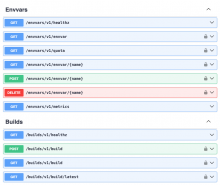We want to be able to expose our openapi definitions for all our toolforge APIs.
This task is to investigate ways to make that possible, some preferences:
- Doing it "on the fly", so we don't have to generate a new definition any of the sub-apis changes
- Doing it in a single definition
- if not possible, we might want a script to generate it?
- Should still be openapi valid
It should be presented by the api gateway (it could be a proxy from it, but it should be exposed externally through the gateway).
We will want to be able to generate our unified client and probably libraries from it.
